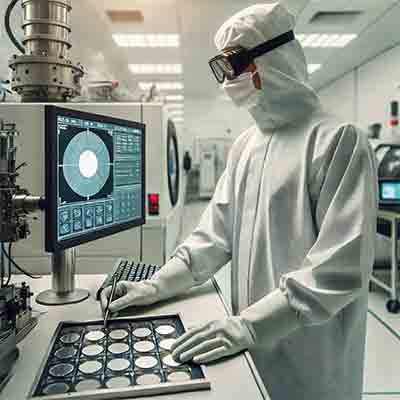Get Your Quote FAST!
Start your semiconductor lab or training project with professional wafer materials. Buy now!
Get Your Quote FAST! Or, Buy Online and Start Researching Today!
What Is a Semiconductor Technician?
A Semiconductor Technician is a skilled professional who supports the fabrication, testing, and maintenance of semiconductor devices and wafers. Their work underpins the production chain—from raw substrates to finished integrated circuits.

Core Responsibilities
- Equipment Operation & Calibration: Use and maintain tools such as lithography, etching, deposition, CMP, or testing equipment.
- Process Monitoring & Quality Control: Track process parameters, perform inspections, and ensure each run meets spec.
- Inspection & Defect Analysis: Use microscopy, metrology, or electrical testing to find wafer or device anomalies.
- Maintenance & Troubleshooting: Identify and repair faults, perform preventive maintenance, and reduce downtime.
- Chemical & Material Handling: Safely manage etchants, cleaners, gases, and other wafer-processing chemicals.
- Data Logging & Reporting: Collect run data, interpret trends, and communicate findings to engineers.
Work Environment & Conditions
Technicians typically operate inside cleanroom environments, wearing full-body suits to minimize contamination. Work schedules may include shifts, nights, or weekends to maintain continuous production runs.
Required Skills & Qualifications
- Technical Foundation: Background in electronics, physics, or semiconductor processes.
- Analytical Skills: Ability to read process data, troubleshoot tools, and analyze failures.
- Attention to Detail: Precision is essential in micro-scale manufacturing.
- Cleanroom Etiquette: Understanding of contamination control, gowning, and safety protocols.
- Team Collaboration: Work with engineers, process specialists, and other technicians.
Education & Career Path
Many start with an associate degree in electronics, microelectronics technology, or semiconductor manufacturing. Certifications or internships in fabs can help. On-the-job training is standard, leading to roles such as Senior Technician, Process Engineer, or Equipment Engineer.
Why Technicians Are Crucial
Technicians bridge the gap between the design and the floor: they keep production running, troubleshoot failures, and maintain yield. In the semiconductor industry, uptime, defect control, and process stability are everything.
What Substrates They Handle
Semiconductor Technicians often deal with wafers and substrates. At UniversityWafer, we support common materials including:
